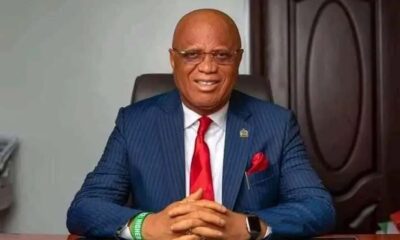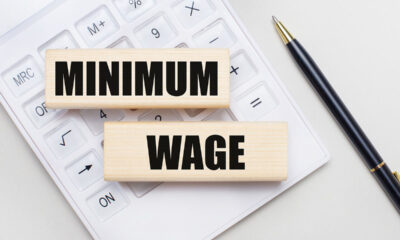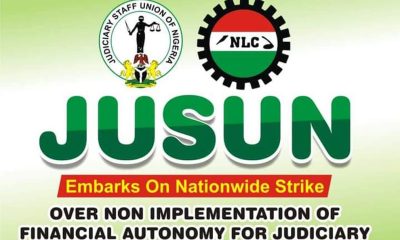News
Labour unions attack state governors for rejecting N60k minimum wage
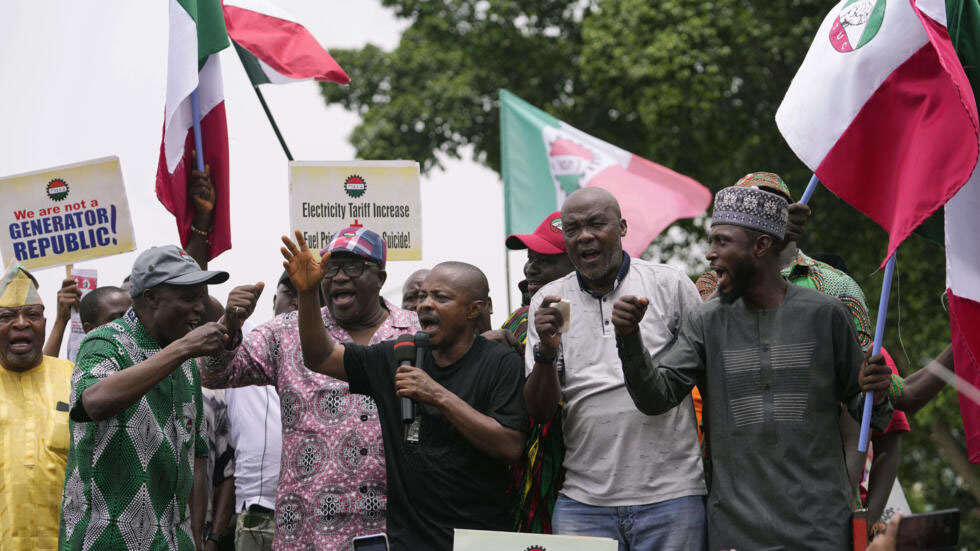
Labour unions attack state governors for rejecting N60k minimum wage
The members of the organised labour have knocked the 36 governors over their stand on the N60,000 minimum wage proposed by the federal government.
The National Labour Congress and the Trade Union Congress expressed their grievances on Saturday.
Leaders of both union described the governors’ comment and actions towards the Nigerian workers as act of wickedness.
They have, however, called on state governors to have a rethink before “danger ahead explodes”.
Recall that governors of the 36 states of the federation outrightly rejected the N60,000 minimum wage earlier proposed by the federal government on Friday.
The governors had on Friday claimed the N60,000 wage is not realistic and unsustainable, arguing that if implemented, it would force some states in the country to borrow to pay workers’ salaries.
Responding to the governor’s claim on Saturday, Benson Upah, the Head of Information and Public Affairs at the NLC headquarters, said in a statement that he wondered why governors forget that the price of fuel, dollar against naira among other things have gone up astronomically.
In his words, “We are alarmed by the statement credited to the Nigeria Governors Forum that state governments cannot even afford to pay N60,000 as minimum wage as ‘a few states will end up borrowing to pay workers every month.
READ ALSO:
- 16-foot python swallows woman, 45, in Indonesia
- BREAKING: Tinubu names Abuja expressway after Chinua Achebe
- Israeli army rescues four hostages from Gaza
“We do believe the governors have acted in bad faith. It is unheard of for such a statement be issued to the world in the middle of an ongoing negotiation. It is certainly in bad taste.
Speaking further on the claims, the two labour said nothing can be further from the truth that FAAC allocations have since moved from “N700 billion to N1.2 trillion making the governments extremely rich at the expense of the people.”
According to them, “All that the governors need to do to be able to pay a reasonable national minimum wage (not even the N60,000) is cut on the high cost of governance, minimise corruption as well as prioritise the welfare of workers.
“It is important to explain here that a national minimum wage is not synonymous with the different pay structures of different states.
The national minimum wage is the lowest floor below which no employer is allowed to pay.
“The aim is to protect the weak and the poor. We are not fixated with figures but value. Those who argue that moving the national minimum wage from N30,000 to N60,000 is sufficiently good enough miss the point.
“In 2019, when N30,000 became the minimum, N300 exchanged for $1 (effectively making the minimum wage an equivalent of $100 or thereabout) while inflation rate was 11.40.
“At the moment the exchange rate is at N1,600 to $1 while inflation hovers at 33.7% (40% for food). This puts the value of the minimum wage at $37.5 for a family of six. This is happening at a time costs of everything rose by more than 400% as a result of the removal of fuel subsidy.
“This is an extreme bad news for the poor. Government’s policies of fuel subsidy removal, mindless devaluation of the Naira, energy tariff hike by 250% and interest rate hike by 26.5% will continue to hurt the economy (especially manufacturing sector) and the poor.
“Already manifest is the mass incapacity of Nigerians leading to overflowing warehouses of the productive sector of the economy. The downward trend will continue except the capacity of workers and businesses is enhanced.
“Paying a miserable national minimum wage portends grave danger to not only the workforce but the national economy as in truth, economies of most states are driven by workers wages.
“In light of this, we urge the governors to do a re-think and save the country from a certain death.”
Labour unions attack state governors for rejecting N60k minimum wage
News
Currency in circulation now N4.8tn – CBN report
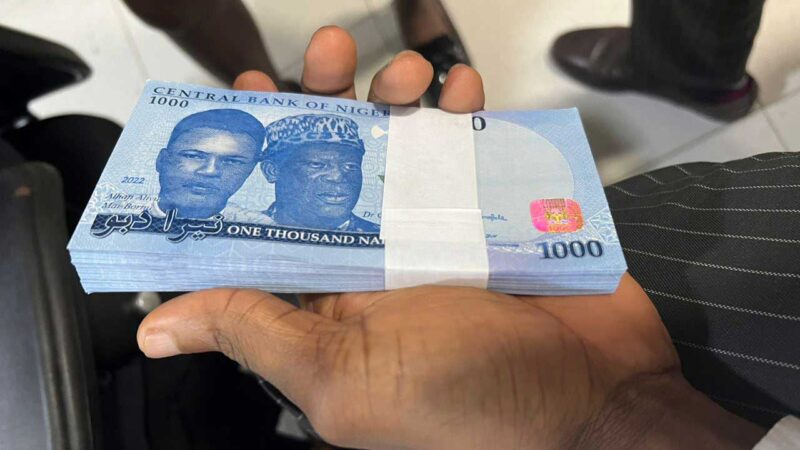
Currency in circulation now N4.8tn – CBN report
Currency in circulation has reached an all-time high of N4.8 trillion as of November 2024, recording over seven per cent increase from the previous month.
Also, currency outside banks grew significantly in the same month hitting an all-time high of N4.6 trillion from the N4.2 trillion in the month of October.
These figures were contained in the money and credit supply data from the Central Bank of Nigeria (CBN).
The currency in circulation is the amount of cash–in the form of paper notes or coins–within a country that is physically used to conduct transactions between consumers and businesses.
It represents the money that has been issued by the country’s monetary authority, minus cash that has been removed from the system.
Similarly, currency outside a bank refers to cash held by individuals, businesses and other entities that is not stored in banks.
The currency outside the bank represents about 96 per cent of the currency in circulation.
Nigerians have in recent times been facing acute cash shortage with banks limiting daily withdrawal at Automated Teller Machines (ATMs) to N20,000 irrespective of the number of accounts held by an account owner.
READ ALSO:
- Cross River man kills mother, dumps body inside well
- El-Rufai mocks Reno Omokri with throwback protest photos against Tinubu
- Warri refinery: Marketers hopeful of further petrol price drop
According to the latest data, the currency in circulation grew by seven per cent to reach 4,878,125.22 from 4,549,217.51 in October.
Currency in circulation has grown steadily in the outgoing year 2024 with over one trillion naira added to cash in circulation after starting the year with N3.65 trillion in January.
In February, the currency in circulation slightly increased to N3.69 trillion representing an increase of N43 billion or 1.18 per cent from the January figure.
March also saw an appreciable increase to N3.87 trillion while it further increased to N3.92 trillion in the following month of April.
The growth trajectory continued in May with the currency in circulation increasing slightly to N3.97 trillion, an increase of N42 billion or 1.07 per cent while it reached an all-time high of 4.04 trillion, an increase of 2.11 per cent from May.
The July figure also rose marginally with the currency in circulation settling for N4.05 trillion before growing to N4.14 trillion in August and N4.43 trillion in September and N4.5 trillion in October.
In the same vein, currency outside banks grew from N4.2 trillion in October to N4.6 trillion in November, showing increasing preference for other means of storing outside bank deposits.
Economist, Dr. Paul Alaje attributed the development to the expanding money supply, adding, “Money supply is expanding but this may not necessarily be in cash. As it is expanding, it will necessarily induce inflation. But you can’t blame the people. People must look for money. How much was bottled water last year, how much is it today? All of this will induce inflation. If you now ask, what is the cause of inflation? Is it money supply itself or a devaluation policy? It is a devaluation policy. Money supply is an offshoot. So the Central Bank is raising interest rates to actually reduce money supply but the more they try the more money supply expands.”
He stated that the floatation policy of the CBN has created inflation, adding, “It is like chasing one’s tail and I don’t know if you are going to catch it.”
Currency in circulation now N4.8tn – CBN report
News
Tinubu not telling Nigerians the truth, says Sule Lamido

Tinubu not telling Nigerians the truth, says Sule Lamido
President Bola Tinubu has been accused of not being forthright about the true state of Nigeria under his administration.
Former Jigawa State Governor and senior Peoples Democratic Party (PDP) member, Sule Lamido, made the accusation while speaking on the BBC Hausa programme Gane Mini Hanya.
Lamido criticized both Tinubu and former President Muhammadu Buhari for what he described as a lack of transparency in governance.
“Buhari’s and Tinubu’s governments are not being transparent with Nigerians unlike during the time when PDP was in power where everything was transparent and open to all Nigerians,” Lamido said.
READ ALSO:
- Odili: Fubara prevented Wike from turning Rivers to private estate
- Putin apologises over Azerbaijan plane crash reportedly shot down
- 256 terrorists, two logistics suppliers arrested in one week – DHQ
He accused the two administrations of relying on propaganda rather than providing citizens with accurate information.
Lamido also expressed concerns over President Tinubu’s recent loan requests, questioning the logic behind them. “If Nigerians are being told the truth then there is nothing wrong with that, but how would you budget N30tn, generate N50tn and then request loan when you have a surplus of N20tn,” he said, referencing last year’s budget.
He described the situation as “reckless” and “selfish,” adding, “This recklessness and clear-cut selfishness is not done anywhere in the world, but yet you find (some) Nigerians supporting it. Visit social media and see how APC is being criticised, being referred to as calamity, yet you find some protecting it.”
Tinubu not telling Nigerians the truth, says Sule Lamido
News
Nigeria Customs Service begins 2025 recruitment [How to apply]

Nigeria Customs Service begins 2025 recruitment [How to apply]
The Nigeria Customs Service (NCS) has announced the commencement of its recruitment exercise, assuring Nigerians that the process is entirely free and fair.
The agency has cautioned the public to be vigilant against scammers who may attempt to exploit unsuspecting applicants during the recruitment period.
Applications are invited for positions in the Superintendent, Inspector, and Customs Assistant cadres as part of the Service’s plan to recruit 3,927 officers in 2025.
This initiative is aimed at enhancing trade facilitation and supporting Nigeria’s economic recovery efforts.
“Our recruitment is entirely free and fair. At no stage do we charge fees. Anyone requesting payment is a scammer,” the agency emphasized, urging applicants to be wary of fraudulent schemes.
READ ALSO:
- Dangote, Tinubu, Lookman, Badenoch named among 100 most influential Africans in 2024
- Heavy security in Ilesa as ex-Osun deputy gov emerges new Owa-Obokun
- Hacker has stolen N180m from my NGO account – VeryDarkMan cries out
The NCS outlined eligibility criteria, stating that applicants must be Nigerian citizens by birth, possess a valid National Identification Number (NIN), and have no criminal record or ongoing investigations.
Academic qualifications for the three cadres are as follows:
Superintendent Cadre: A university degree or Higher National Diploma (HND) along with an NYSC discharge or exemption certificate.
Inspectorate Cadre: A National Diploma (ND) or Nigeria Certificate in Education (NCE) from an accredited institution.
Customs Assistant Cadre: At least an O’Level certificate (WAEC or NECO).
In addition to these qualifications, the NCS stressed that all applicants must be physically and mentally fit, providing evidence of medical fitness from a recognized government hospital.
Nigeria Customs Service begins 2025 recruitment [How to apply]
-

 Politics3 days ago
Politics3 days agoGbajabiamila speaks on his rumoured Lagos governorship ambition
-

 metro3 days ago
metro3 days agoFarotimi to pursue disbarment over arrest, defamation allegations
-

 Business2 days ago
Business2 days agoReal reason Dangote, NNPC drop petrol price — IPMAN
-

 Health2 days ago
Health2 days agoABU Teaching Hospital will begin kidney transplant in 2025 – CMD
-

 Sports1 day ago
Sports1 day agoAnthony Joshua prostrates before Governor Abiodun during Ogun visit
-

 metro3 days ago
metro3 days agoEl-Rufai accuses Tinubu govt of Yoruba agenda, Reno Omokri reacts
-

 metro3 days ago
metro3 days agoNigerian govt urged to intervene in Mozambique post-election violence
-
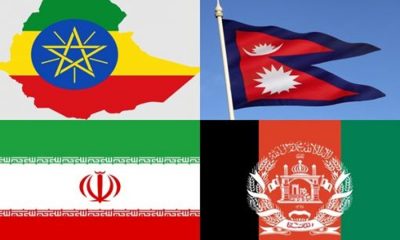
 metro20 hours ago
metro20 hours agoFour countries that won’t celebrate New Year

